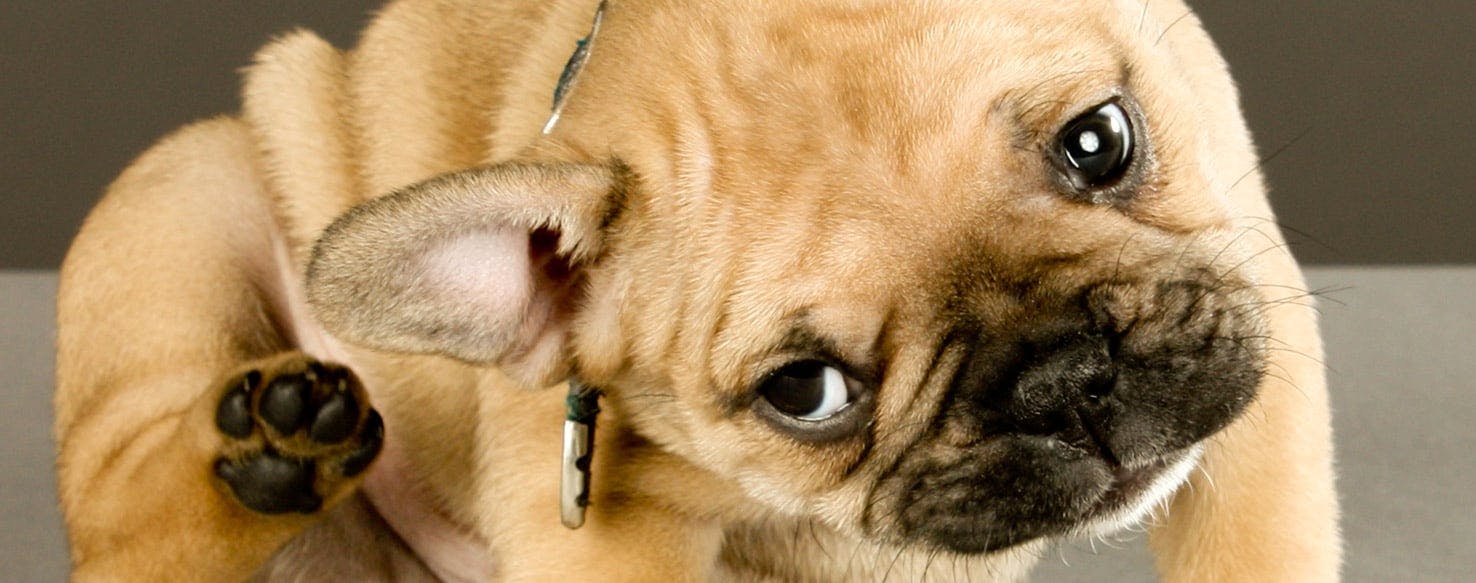Dogs can get dandruff just like people can, but they are not nearly as self-conscious about it!
No panicking to get rid of unsightly flakes before a big event--the only thing your dog is concerned about is that dandruff can be accompanied by itchy skin, and may be uncomfortable.
The main symptom of dandruff, referred to as seborrhea, is dry flaky skin appearing as little white specks all over your dog’s fur coat. Other symptoms that may accompany dandruff are itching, thinning hair, scabs, bumps, oily skin, or other skin conditions. Dandruff is unsightly, but more importantly, the underlying dry or oily skin condition is uncomfortable for your best buddy and leads to scratching, which can result in infections.
Depending on your dog's breed, they may be more predisposed to either the oily or dry type of dandruff. Oily dandruff is more common in Basset Hounds, Spaniels, Retrievers, and West Highland Terriers. Dry dandruff is more frequently seen in Dachshunds, Dobermans, German Shepherds, and Setters.
Both types are treated with the appropriate anti-dandruff shampoos, one containing sulfur, iodine or salicylic acid for dry dandruff and one containing coal tar, benzoyl peroxide or selenium sulphide for oily dandruff. When determining if your dog has dandruff you will need to rule out that your dog's dandruff is not “walking dandruff”, which is actually mites, not dead skin flakes at all! Mites can be commonly mistaken for dandruff until everyone in the house has “walking dandruff”!
Causes of Dandruff
Inherited Conditions
Dandruff usually occurs secondary to another condition. However, it can occur as a primary, inherited condition. In these cases, prevention is difficult, but regular treatment with an anti-dandruff shampoo, ensuring the dog has a high quality diet, and supplementing their diet with fatty oils may help reduce the severity of the condition. Also, grooming your pup regularly to remove dead hair and skin and to smooth naturally occurring body oils over your dog's skin and hair coat may be beneficial in reducing dandruff.
Parasites
Mites, fleas, and worms may result in allergic dermatitis and skin conditions that result in dead flaky skin producing dandruff. If your dog has a parasitic infestation, treatment of the pesky critters with oral or topical anti-parasitic medication and shampoo to resolve the condition will prevent dandruff. Regular pest control, including keeping your dog in a clean, parasite-free environment, will prevent future outbreaks and dandruff or allergic dermatitis from parasites.
Allergies
Allergies in general can also result in itchy skin conditions and dandruff. Identifying the allergen triggering your dog's immune system response can be challenging. If possible, removal or reduction of any irritants such as chemicals or plant pollen in your dog's environment may reduce symptoms. Many dogs are sensitive to a component in their diets, especially preservatives and additives in commercial foods. Providing a natural, high protein diet and trying different foods to determine what your dog is reacting to may be required. Antihistamines and steroids can reduce allergic reactions, preventing skin conditions and dandruff occurring as a result of the allergy response.
Infections
Bacterial or yeast infections on your pup's skin can result in skin conditions causing dandruff as well. Treatment of these conditions with antibiotics or antifungals as appropriate, and topical medications to ease skin symptoms, will address the condition and prevent secondary skin conditions and dandruff from occurring.
Endocrine Conditions
Some endocrine disorders such as Cushing's Disease or hypothyroidism, can result in skin conditions and dandruff. Treatment of these disorders with hormone-regulating or replacement therapy will address symptoms of the disease such as dandruff.
Diet and Environment
A poor diet, obesity, or exposure to hot, cold, low humidity or high humidity can all cause or aggravate a dandruff condition in your dog.
Preventing Dandruff
The following steps can help address, reduce or prevent dandruff in your dog that could be occurring from the above causes.
-
Groom your dog and massage their skin to spread natural skin oils if dry skin is present. This removes dead hair and skin, and smooths natural oils throughout coat. Start with a coarse brush, then a soft brush, then rub with a rub rag or towel.
-
Supplement your dog's diet with fatty acids. Ensure they have a high quality diet to promote skin and hair coat health. Do not overfeed your dog and exercise your dog regularly.
-
Rinse your furry companion with lime juice; the vitamin C helps prevent dandruff.
-
Use a humidifier if your pooch has dry skin and is exposed to low humidity, as often occurs in the winter or in arid climates. Avoid exposing your dog to extreme temperatures or humidity.
-
Regularly shampoo with the appropriate anti-dandruff shampoo. Dogs require special dandruff shampoo as they have a different skin pH then we do, so do not use human shampoos. Shampoos containing sulfur, iodine or salicylic acid are used for dry dandruff, and shampoos containing coal tar, benzoyl peroxide or selenium sulphide are used for oily dandruff.
-
To provide your dog comfort, soothe sore, itchy skin with oatmeal preparations or shampooing with oatmeal.
Getting to the Root of the Problem
Dandruff is an annoying, but not serious, condition on its own. However, causes of dandruff such as parasitic or bacterial infections or endocrine disorders need to be addressed. In this way, dandruff can reveal a more serious condition in your dog. Addressing the problem causing the dandruff and preventing the flakes with medicated shampoos are effective forms of prevention. Ensuring a balanced diet, grooming, parasite control, temperature, and humidity control help with dandruff and contribute to your dog's overall health and well being.


